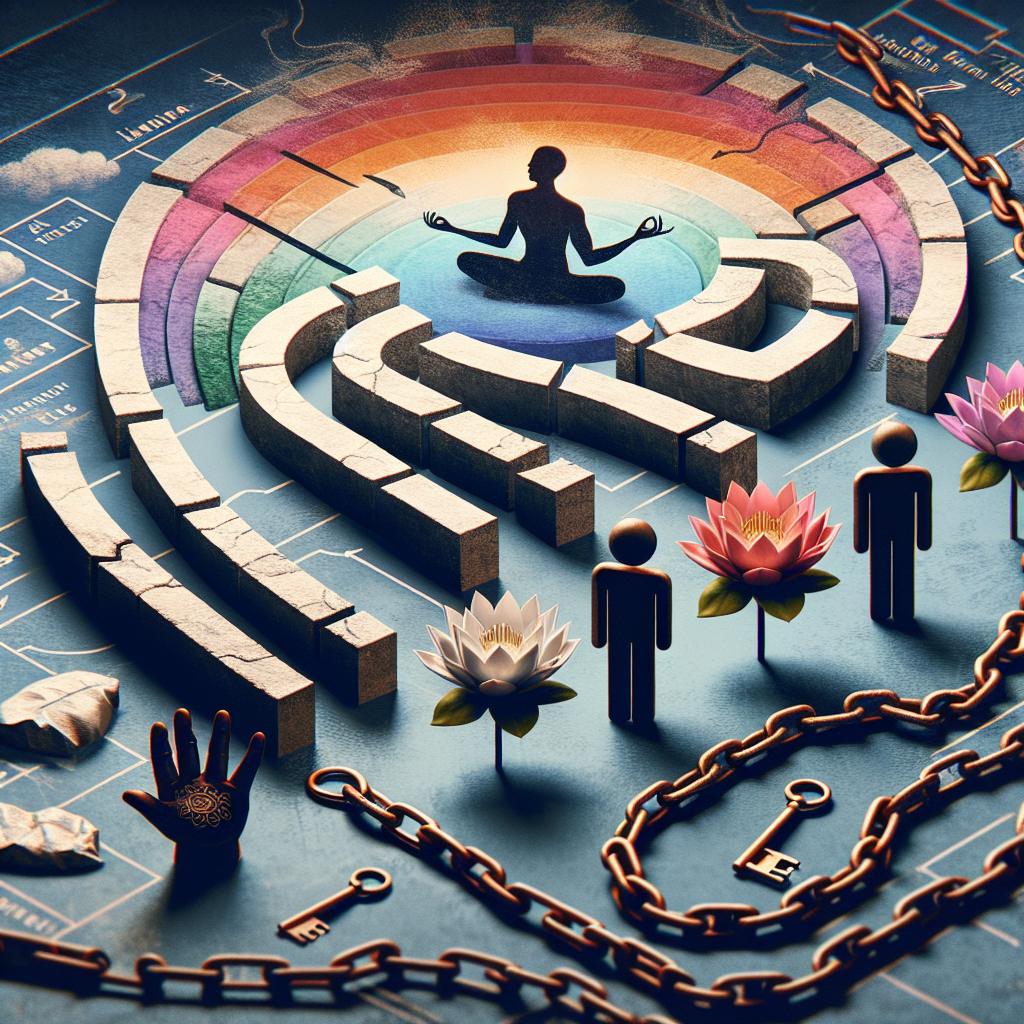Karma is a concept that has its roots in ancient Eastern religions, particularly in Buddhism and Hinduism. Traditionally understood as the law of cause and effect, karma suggests that our actions, whether good or bad, have consequences that can ripple through our lives, shaping our experiences and realities. While often viewed through a spiritual lens, the principles of karma can also be applied practically to our day-to-day lives, serving as a guiding philosophy for personal growth and transformation. This article delves into how karma shapes our reality, offering insights and actionable strategies for unlocking its secrets to the growth that can lead to a more fulfilled life.
The Foundations of Karma
What is Karma?
At its core, karma refers to the idea that every action has an equal and opposite reaction. This principle goes beyond mere physical actions to encompass thoughts, intentions, and emotions. In essence, karma is not just about what we do; it’s about who we are and the energy we put out into the world.
The Historical Context of Karma
While Western societies often emphasize the concept of justice and reward/punishment, Eastern philosophies view karma as a natural law. The roots of karma can be traced back to ancient texts such as the Vedas, Upanishads, and the teachings of the Buddha. These scriptures teach that karma operates within the framework of samsara, the cycle of birth, death, and rebirth. This signifies that our current actions shape not only our present but also our future incarnations.
The Mechanics of Karma
Understanding Cause and Effect
Karma operates like a universal law of causation. Every thought, word, and deed sends out vibrations that can influence our surroundings and relationships. For example, if we approach others with kindness and respect, this energy tends to generate goodwill in return. Conversely, negative actions or thoughts may invite conflict or hardship. In this sense, understanding karma can empower us to be conscious of our choices and their impact on ourselves and the world around us.
The Role of Intention
Intention plays a critical role in karma. The Sanskrit term “karma” translates to “action,” but it also encompasses the intention behind that action. For example, helping someone out of genuine compassion generates more positive karma than offering assistance out of a sense of obligation. Thus, cultivating good intentions can serve as a powerful catalyst for personal transformation and growth.
The Power of Choice
Karma teaches us about the power of choice. Though we may not control every circumstance in our lives, we can exercise agency over our responses. Each moment presents us with a choice, and our decisions can steer the course of our lives. Acknowledging this power is the first step toward taking responsibility for one’s life experiences.
How Karma Influences Personal Growth
Self-Reflection and Awareness
Understanding karma encourages self-reflection. To grow, we must first examine our past actions, thoughts, and behaviors. Self-awareness helps us recognize patterns and identify areas for improvement. Reflection prompts us to ask difficult questions about our motives and the impact we have on others.
Learning from Consequences
When faced with challenges or conflicts, we can analyze the events that led us there to glean insights and lessons. Exploring how our previous behaviors contributed to current situations can reveal the underlying karmic relationships at play. This learning process fosters resilience and encourages us to make more mindful choices moving forward.
The Ripple Effect of Kindness
Acts of kindness generate positive karma, creating a ripple effect that can enhance not only individual growth but also community well-being. By consciously engaging in altruistic behaviors—volunteering, lending a helping hand, or offering encouragement—we foster a supportive environment that benefits everyone involved.
Releasing Negative Patterns
Negative karma can manifest in recurring patterns—such as toxic relationships or self-sabotaging behaviors—that inhibit our growth. Recognizing these karmic cycles allows us to confront and release them, facilitating a healthier, more fulfilling life narrative. This release involves letting go of past grievances and embracing forgiveness, both for ourselves and others.
The Journey of Compassion
Karma emphasizes empathy and compassion as essential components of personal development. Interacting with others from a place of love and understanding fosters deeper connections. As we cultivate compassion, we not only accumulate positive karma but also transform our relationships into sources of joy and healing.
Practical Steps to Harnessing Karma for Growth
Cultivating Mindfulness
Mindfulness practices, such as meditation and yoga, increase our awareness of thought patterns and emotional responses. By cultivating mindfulness, we become more discerning about our actions and their potential consequences. This heightened awareness can help us align our actions with our higher values and intentions.
Setting Intentions
Setting daily or weekly intentions can help guide our actions and decisions. By consciously choosing to embody specific virtues—like kindness, patience, or gratitude—we create a framework for our behavior, making it easier to sync our actions with our goals for growth.
Acts of Kindness
Small acts of kindness can be transformative, both for the giver and the receiver. Whether it’s a kind word, volunteer work, or simply lending a listening ear, each act contributes to a more compassionate world and generates positive karma.
Embracing Gratitude
Gratitude transforms our perspective and opens our hearts to abundance. Practicing gratitude allows us to appreciate the lessons learned from life’s challenges, reinforcing the idea that even difficult experiences contribute to our growth.
Seeking Forgiveness
Forgiving oneself and others is essential for releasing negative karma. The process of forgiveness involves acknowledging the hurt, expressing vulnerability, and choosing to move forward without resentment. This act of compassion frees us from debilitating emotional burdens and opens the gate for positive energies to flow.
Unlocking Personal Transformation Through Karma
Viewing Obstacles as Opportunities
As we learn to navigate our lives through the lens of karma, we begin to view obstacles as opportunities for growth. Challenges can lead to profound insights, offering lessons that can empower us. Acknowledging this perspective shift opens the door to resilience and creative problem-solving.
Building Positive Relationships
Karma teaches that our relationships are a vital part of our growth journey. Building and nurturing positive relationships, characterized by open communication, respect, and shared values, creates a supportive environment conducive to personal development. Surrounding ourselves with supportive individuals amplifies positive karma and cultivates a sense of belonging.
The Journey of Self-Discovery
Engaging with karmic principles encourages an ongoing journey of self-discovery. Each experience enriches our understanding of ourselves and our place in the universe. Embracing this process can lead to transformational personal growth, revealing our strengths, vulnerabilities, and unique contributions to the world.
Trusting the Process
Understanding karma also teaches us to trust the process. Life unfolds in its own unique timeline, and while we may desire immediate results, it’s essential to believe that our efforts will yield rewards in accordance with karmic principles. Patience becomes a virtue as we navigate the ebb and flow of our experiences, trusting that positive karma accumulates over time.
Advancing Beyond the Individual: Karma and Society
Collective Karma
Karma is not just an individual experience; it extends to communities and societies. The collective actions of groups shape the broader realities of the human experience. Engaging in positive community initiatives, fostering inclusivity, and advocating for justice contribute to the creation of a healthier, more harmonious society.
Creating Sustainable Change
Karma emphasizes a cycle of responsibility and accountability. When individuals and communities take action toward positive change without expecting immediate rewards, they accumulate positive karma that can catalyze lasting impact. Sustainable change is intricately linked to collective efforts that reflect compassion and empathy on a larger scale.
Global Perspectives
In a globalized world, understanding karma allows for a broader perspective on the interconnectedness of humans and the planet. It highlights the significance of our actions, including environmentally sustainable practices, in shaping the karma we share with future generations. Embracing our role in a global context fosters a sense of purpose and responsibility.
Conclusion
Karma is a powerful lens through which we can view our lives, guiding us toward personal growth and transformation. By embracing the principles of karma—self-awareness, intention setting, compassion, and mindfulness—we unlock the secrets to shaping our realities. Whether through individual actions or collective efforts, understanding karma fosters a deep sense of connection, enabling us to navigate life with purpose and resilience.
In essence, karma teaches us that our actions ripple through time and space, influencing not only our individual paths but also the collective journey of humanity. As we commit to conscious living, we contribute to a more positive and compassionate world, one act of kindness at a time.
FAQs
1. What is karma, and how does it work?
Karma refers to the law of cause and effect, suggesting that our actions—both good and bad—generate consequences that shape our lives. It operates on the principle that what we put out into the world returns to us, often in unexpected ways. The intention behind actions is also a key component of karma.
2. Can we change our karma?
Yes, we can change our karma by making mindful choices and consciously engaging in positive actions. By reflecting on past behaviors and choosing to act with kindness, compassion, and integrity, we can create new patterns of positive karma and mitigate negative karma.
3. How does karma relate to personal growth?
Karma encourages self-reflection and awareness, allowing us to learn from our experiences and uncover patterns in our behavior. By understanding our actions and their impact on ourselves and others, we can embark on a path of continuous personal growth and development.
4. Is karma only about individual actions?
While karma often focuses on individual actions, it can also extend to collective experiences within families, communities, and societies. The actions of groups contribute to collective karma, shaping shared experiences and realities.
5. How can I cultivate a positive karmic environment?
To cultivate a positive karmic environment, focus on engaging in acts of kindness, setting positive intentions, practicing gratitude, and fostering open communication. Nurturing positive relationships and contributing to community well-being can also magnify positive karma.
6. Can negative karma be resolved?
Yes, negative karma can be resolved through acts of forgiveness, compassionate actions, and a commitment to personal growth. By recognizing harmful patterns, releasing guilt or resentment, and engaging in self-reflection, we can mitigate negative karma and create space for positive change.
7. How does mindfulness relate to karma?
Mindfulness promotes awareness of our thoughts, actions, and intentions. By being present and conscious, we can make more intentional choices that align with our values and contribute positively to our karma.
8. Why is trusting the process important in relation to karma?
Trusting the process acknowledges that change and growth take time. By allowing the natural unfolding of life and recognizing that positive karma accumulates over time, we cultivate patience and resilience, ultimately enhancing our life experience.
Embracing karma can lead us to a life of purpose, fulfillment, and interconnectedness. It provides a framework through which we can understand our roles in shaping not only our own realities but also the collective journey of humanity.
It seems like you might be looking for a prompt to get started on a particular topic. Could you please clarify what type of prompt you need or the subject you want to explore? This could be for writing, art, brainstorming, or something else entirely!, #Karma #Shapes #Reality #Unlocking #Secrets #Growth, #Karma #Shapes #Reality #Unlocking #Secrets #Growth, 1734033417, how-karma-shapes-your-reality-unlocking-the-secrets-to-growth





